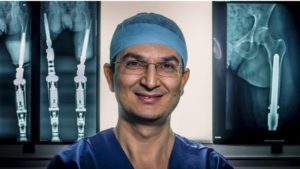Amputee’s plea for asylum seekers
A woman who lost her leg has made an impassioned plea in defence of asylum seekers citing a refugee surgeon who helped her walk again.
Mother-of-two Allison France – whose leg was severed after being struck by a car five years ago – has called on Malcolm Turnbull to reconsider banning asylum seekers from Australia for life.
The Brisbane amputee had undergone a life-changing operation performed by Dr Munjed Al Muderis who fled to Australia from Iraq by boat.
 “I was destined to spend my life in a wheelchair until I met Dr Munjed Al Muderis,” she wrote in an open letter, posted on her Twitter page that has gone viral.
“I was destined to spend my life in a wheelchair until I met Dr Munjed Al Muderis,” she wrote in an open letter, posted on her Twitter page that has gone viral.
“I owe my health, my ability to walk and have a decent quality of life with my children to Dr Al Muderis.”
At the time of Ms France’s accident, Dr Al Muderis was the only surgeon in Australia who could perform an osseointegration surgery – a metal implant inserted between the bone and prosthesis to allow movement.
“I am writing to protest your latest announcement regarding genuine refugees and their travel to and resettlement in Australia,” Ms France said.
“Under your new policy, he would never have made it to Australia.
“He has made a huge contribution to our country. I urge you to reconsider your position on this issue and consider the welfare and happiness of Australians like me.”

Prof Al Muderis
Associate Professor Munjed Al Muderis fled Iraq after he was ordered by soldiers to surgically remove the ears of Iraqi defectors in Baghdad and after his chief surgeon was shot for refusing.
Fleeing to Australia as a refugee, Prof Al Muderis spent months at Curtin Detention Centre in Western Australia waiting to be processed; a time he says was one of the lowest points in what he calls the wheel of life.
He has told of his journey from asylum seeker to world-leading surgeon in his heartbreaking and inspiring autobiography, Walking Free.
Prof Al Muderis was born in 1972 to an agnostic aristocratic family in Baghdad, but experienced the turmoil of his country from a young age when the war with Iran broke out in 1980.
As an 8-year-old in 1981 he was nearly killed by machine gun fire from an Iranian fighter plane in Baghdad.
After studying medicine at Baghdad University, Prof Al Muderis began his first year residency in 1999 and encountered those consequences first hand.
In Iraq, military service was compulsory, and Saddam issued an order that all deserters would be punished with disfigurement.
One morning, Saddam’s henchmen rounded up army deserters and brought them to the hospital where Prof Al Muderis worked, in order to get the doctors to disfigure the deserters by surgically removing the tops of their ears.
The most senior doctor refused as he had sworn an oath to do no intentional harm to his patients. As a result he was promptly marched to the car park, briefly interrogated and shot in front of medical staff including Prof Al Muderis.
Forced with no other options besides death or compliance, Prof Al Muderis hid in the women’s toilet cubicle for hours and planned his escape from Iraq.
“I didn’t know how I could keep one step ahead of the Iraqi authorities, but I did know that if they caught me, I would face intense – and potentially brutal – interrogation before the ultimate sanction of death,” Prof Al Muderis wrote.
With the help of friends, he managed to flee to Jordan before making his way to Indonesia via Abu Dhabi and Malaysia.
From Java he crammed onto a boat with 150 other asylum seekers bound for Christmas Island, all with hopes of starting new lives for themselves.
During the difficult and dangerous journey Prof Al Muderis used his medical skills to treat fellow passengers, including several pregnant women that were suffering from severe sea sickness.
Finally, after 10 months Prof Al Muderis was freed after being recognised as a refugee, and began another long journey to obtain his Australian medical qualifications.
Laurie Nowell
AMES Australia Senior Journalist












